
Metacomet, also known as Pometacom, Metacom, and by his adopted English name King Philip, was sachem to the Wampanoag people and the second son of the sachem Massasoit. His older brother Wamsutta briefly became sachem after their father's death in 1661. However, Wamsutta also died shortly thereafter and Metacom became sachem in 1662.

King Philip's War was an armed conflict in 1675–1676 between a group of indigenous peoples of the Northeastern Woodlands against the English New England Colonies and their indigenous allies. The war is named for Metacom, the Pokanoket chief and sachem of the Wampanoag who had adopted the English name, Philip, because of the friendly relations between his father Massasoit and the Plymouth Colony. The war continued in the most northern reaches of New England until the signing of the Treaty of Casco Bay on April 12, 1678.
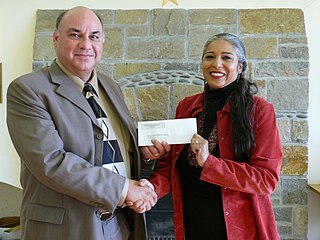
The Wampanoag, also rendered Wôpanâak, are a Native American people of the Northeastern Woodlands currently based in southeastern Massachusetts and formerly parts of eastern Rhode Island. Their historical territory includes the islands of Martha's Vineyard and Nantucket.
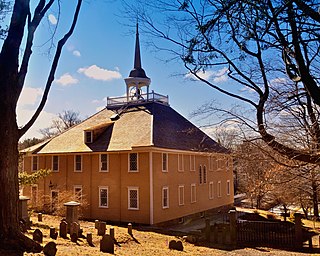
Hingham is a town in northern Plymouth County in the U.S. state of Massachusetts. Part of the Greater Boston region, it is located on the South Shore of Massachusetts. At the 2020 census, the population was 24,284. Hingham is known for its colonial history and location on Boston Harbor. The town was named after Hingham, Norfolk, England, and was first settled by English colonists in 1633.

John Endecott, regarded as one of the Fathers of New England, was the longest-serving governor of the Massachusetts Bay Colony, which became the Commonwealth of Massachusetts. He served a total of 16 years, including most of the last 15 years of his life. When not serving as governor, he was involved in other elected and appointed positions from 1628 to 1665 except for the single year of 1634.
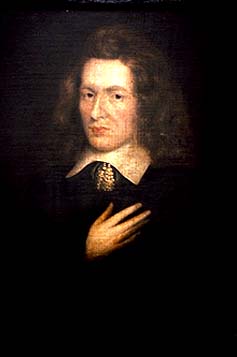
Josiah Winslow was the 13th Governor of Plymouth Colony. In records of the time, historians also name him Josias Winslow, and modern writers have carried that name forward. He was born one year after the Charter which founded the Massachusetts Bay Colony, bringing over 20,000 English immigrants to New England in the 1630s. Josiah was the Harvard College-educated son of Mayflower passenger and Pilgrim leader and Governor Edward Winslow and was Governor from 1673 to 1680. The most significant event during his term in office was King Philip's War, which created great havoc for both the English and Indian populations and changed New England forever. Josiah was the first governor born in a "New England" colony.
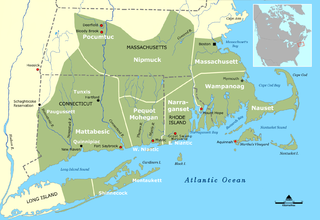
The Massachusett are a Native American tribe from the region in and around present-day Greater Boston in the Commonwealth of Massachusetts. The name comes from the Massachusett language term for "At the Great Hill," referring to the Blue Hills overlooking Boston Harbor from the south.
Praying Indian is a 17th-century term referring to Native Americans of New England, New York, Ontario, and Quebec who converted to Christianity either voluntarily or involuntarily. Many groups are referred to by the term, but it is more commonly used for tribes that were organized into villages. The villages were known as praying towns and were established by missionaries such as the Puritan leader John Eliot and Jesuit missionaries who established the St. Regis and Kahnawake and the missions among the Huron in western Ontario.
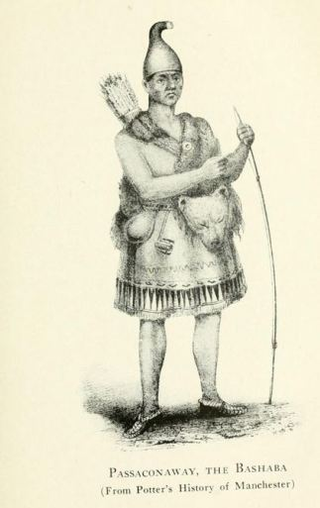
Passaconaway was a 17th century sachem and later bashaba of the Pennacook people in what is now southern New Hampshire in the United States, who was famous for his dealings with the Plimouth and Massachusetts Bay Colonies.

The history of Dedham, Massachusetts, 1635–1699, begins with the first settlers' arrival in 1635 and runs to the end of the 17th century. The settlers, who built their village on land the native people called Tiot, incorporated the plantation in 1636. They sought to build a community in which all would live out Christian love in their daily lives, and for a time did, but the Utopian impulse did not last. The system of government they devised was both "a peculiar oligarchy" and "a most peculiar democracy." Most freemen could participate in Town Meeting, though they soon established a Board of Selectmen. Power and initiative ebbed and flowed between the two bodies.
Nanepashemet was a sachem and bashabe or great leader of the Pawtucket Confederation of Abenaki peoples in present-day New England before the landing of the Pilgrims. He was a leader of Native peoples over a large part of what is now coastal Northeastern Massachusetts.
Wompatuck, also spelled Wampatuck, was sachem, or paramount chief, of the Mattakeesett band of Massachusett Indians.

Norton is a town in Bristol County, Massachusetts, United States, and contains the villages of Norton Center and Chartley. The population was 19,202 at the 2020 census. Home of Wheaton College, Norton hosted the Dell Technologies Championship, a tournament of the PGA Tour held annually on the Labor Day holiday weekend at the TPC Boston golf club until 2018.

Chickatawbut was the sachem, or leader, of a large group of indigenous people known as the Massachusett tribe in what is now eastern Massachusetts, United States, during the initial period of English settlement in the region in the early seventeenth century.
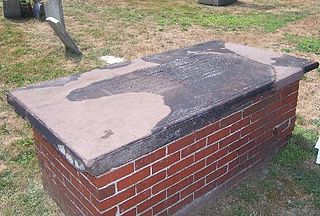
Major-General Humphrey Atherton, an early settler of Dorchester, Massachusetts, held the highest military rank in colonial New England. He first appeared in the records of Dorchester on March 18, 1637 and made freeman May 2, 1638. He became a representative in the General Court in 1638 and 1639–41. In 1653, he was Speaker of the House, representing Springfield, Massachusetts. He was chosen assistant governor, a member of the lower house of the General Court who also served as magistrate in the judiciary of colonial government, in 1654, and remained as such until his death." He was a member of the Ancient and Honorable Artillery Company of Massachusetts and held the ranks of lieutenant and captain for several years before rising to the rank of major-general. He also organized the first militia in Massachusetts.
General James Cudworth was one of the most important men in Plymouth Colony. He served as Deputy to the Plymouth General Court (1649), Commander of militia in King Philip's War (1675–8), Assistant Governor and Deputy Governor (1681–2) of Plymouth Colony, and Commissioner to the New England Confederation.
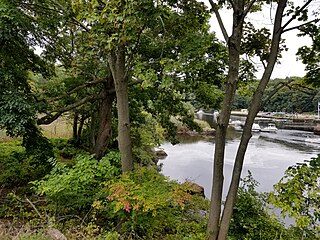
Cutshamekin was a Native American leader, who was a sachem of the Massachusett tribe based along the Neponset River and Great Blue Hill in what is now Dorchester, Massachusetts and Milton, Massachusetts before becoming one of the first leaders of the praying Indian town of Natick, Massachusetts. He is the possible namesake of Jamaica Plain.

Quashaamit was a bilingual Praying Indian sachem or sub-sachem, and teaching minister. His tribal affiliation may have Nipmuc, Massachusett, and/or Wampanoag.
The Atherton Trading Company also known as the Atherton Syndicate was formed in 1659; with Humphrey Atherton and John Winthrop, Governor of Connecticut at the helm. This partnership of merchants and investors included Simon Bradstreet, Daniel Denison, Elisha Hutchinson, Richard Smith and Boston traders; John Tinker, Amos Richardson and William Hudson. Edward Hutchinson joined and by 1661, Plymouth investors included Josiah Winslow, John Brown and Thomas Willet. Their land speculation in the Narragansett area of Rhode Island was at the expense of the Native American inhabitants.
The Fisher-Whiting House is an historic home in Dedham, Massachusetts originally built around 1669 by Anthony Fisher, Jr. Located at 218 Cedar Street, it is the second oldest house in Dedham after the Fairbanks House.














